The relationship between Alex Danvers and Maggie Sawyer in Supergirl S2—ship name ‘Sanvers’—swaggered into our hearts last year with its sarcastic banter, mutual respect, and endearing undertone of good-natured competitiveness. From the first moment that Alex kicked Maggie off her crime scene and Maggie sassed her about her team’s evidence bagging skills (or lack thereof), the potential chemistry between them was palpable.
However, we (the combined forces of Kylie and Gretchen) noted an unevenness in Supergirl’s second season last year, especially when it came to writing Sanvers. The first 8 episodes before the winter hiatus (what we call “2A”) had a very different focus than episodes 9-22 (“2B”). And not just because 2A was far more focused on Alex’s coming out story and 2B on the relationship, though that is a significant part of it.
In our S2 retrospective, we noted the rushed nature of Maggie and Alex getting together, almost as if the show had initially planned for more of a slow burn. We also noted that Maggie lacked a consistent backstory and characterization throughout most of S2. Elements seemingly seeded in 2A were dropped or replaced with different facets in 2B. It was difficult, therefore, to talk much about Maggie as a character outside of her relationship to and with Alex. Difficult, but not impossible, as you’ll see, because we want to discuss how the ‘conclusion’ to their relationship in S3 played out.
Back to the Start
While we didn’t know much about Maggie in 2A, her casual sarcasm seemed to be a mask for deep hurt, especially from human beings, including both her family and previous romantic relationships.
“I don’t strictly date aliens for the record, though I do like them more than most humans. I can relate to them, I guess. Growing up a non-white, not straight girl in Blue Springs Nebraska, I might as well have been from Mars. I was an outcast, and I felt like it.” —Maggie (2×03 “Welcome to Earth”)
Maggie never felt like she fit it anywhere. That she had her heart broken by human women she’d dated and a healthy distrust of them as a consequence also seemed to lie behind the wall of casual flirting and snide remarks. When her girlfriend at the beginning of the season breaks up with her, she tells Alex:
“Well, she said I was hard-headed, insensitive, obsessed with work… Also borderline sociopathic, and she never wants to see me again.” —Maggie (2×05 “Crossfire”)
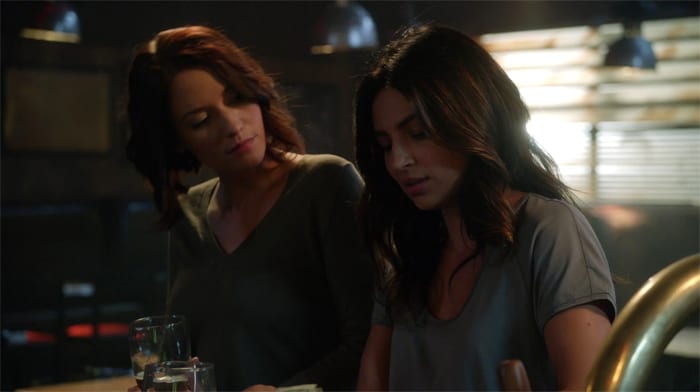
To us, this reads as Maggie being the aggrieved party. We theorized that because of her childhood as an outsider, she’d built up walls around herself that very few, if any, people were able to get through. Her devil-may-care facade was just that: a facade. A mask to cover deep-seated hurt and distrust. She likely threw herself into her work to protect herself from getting hurt or rejected. The revelation in 2B that Maggie had cheated on her ex and that led to the breakup threw a wrench into that theory (as well as making no sense characterization-wise, but we’ll let it slide). However it did potentially establish a pattern of self-sabotage, perhaps even one to protect herself from getting hurt. An ‘I’ll hurt them before they hurt me’ kind of thing.
Alex, for her part, went into the relationship with Maggie with a fresh-faced innocence and ardor that initially turned Maggie off. Alex’s coming out arc in 2A made it clear that she’d never felt satisfied in a sexual or romantic relationship prior to Maggie. Based on what she explained to Maggie, she’d wondered if she might be asexual.
“But the one part of my life that I’ve never been able to make perfect was dating. I just never really liked it. And, you know, I mean, I tried. I got asked out. I just I never liked being intimate. I don’t know. I thought maybe that’s just not the way I was built. You know, it’s just not my thing.” —Alex (2×05 “Crossfire”)
Like many women who come out when they’re older, Alex’s journey to understanding her sexuality began with her attraction to a specific woman—Maggie—rather than a more generalized notion of being attracted to women. Alex’s burgeoning feelings for Maggie came to a head in 2×06 “Changing” when Alex kissed Maggie after Maggie congratulated her for telling Kara that she’s gay.
Her eagerness to start a relationship, however, wasn’t in line with Maggie’s gut instinct. Maggie feared that Alex being a newly self-identified woman loving woman (wlw) would lead to an overly idealistic view both of Maggie and the relationship.
“We’re at really different places, and everything is changing for you and everything is going to feel really heightened and shiny. You should experience that for yourself, not just to be with me. And I shouldn’t get involved with someone who’s just fresh off the boat. Those relationships never really work out.” —Maggie (2×06 “Changing”)
A part of Alex’s coming out story was also the realization that she’d been closed off from herself for years due to the pressure to take care of and protect Kara. Where Maggie used work to escape from her fear of rejection (potentially self-sabotaging relationships in the process), Alex had used her work to avoid digging deeper into her confusing, conflicting feelings. A process she wasn’t even over when J’onn recruited her three years prior to the start of S1.
“It’s hard, isn’t it? Someone comes into your life with these extraordinary powers, and you feel like you can never measure up. Like there’s nothing special about you. You are special, Alex, and you can’t afford to throw your life down the drain.” —J’onn/Hank (1×17, “Manhunter”)
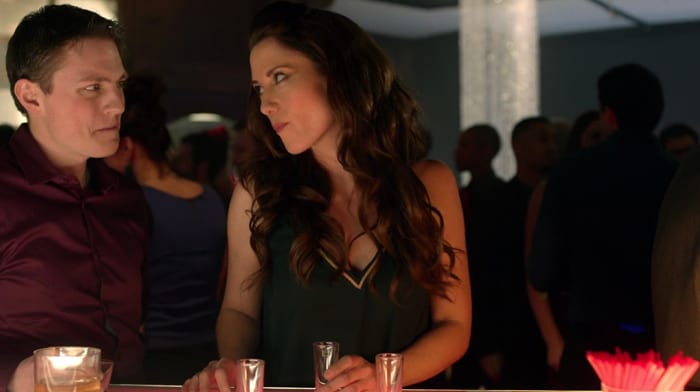
S1 established that a part of Alex’s struggle growing up as Kara’s sister was the struggle both to feel loved for who she was and to make space for herself. What we saw in S1, coupled with her conversation with Kara about coming out in 2×06, fit well with the idea that a significant chunk of her inability to perceive her own feelings for women flowed from her setting aside personal self-reflection in order to take care of her sister. Kara herself mirrored this to Alex:
Kara: I think I owe you an apology.
Alex: For what?
Kara: For not creating an environment where you felt like you could talk about this with me. All those years we spent together growing up, the endless nights talking and sharing–now I realize that they were all about me and my secret. There’s never been room for you, and that’s my fault. And I’m so sorry.
Alex: You didn’t do anything wrong.
Kara: And I know…I know that this is not the same at all, but I do know how it feels to keep a part of yourself shut off, to keep it inside. And I know how lonely that can make you feel. But Alex, you are not alone. (2×06, “Changing”)
Alex realizes that she’d been closed off about herself and her needs not just to her family, but to herself. She had buried her feelings for women underneath layers of obligation for her sister put on by her parents. That isn’t to say there’s no love there. Alex clearly cares deeply about Kara and loves her. We just feel the need to point this aspect of her story and dynamic because it’s relevant to what we see in S3.
Anyway, Maggie ends up changing her mind, believing that life (and television seasons) are too short for slow burns, and she wants to kiss the girls she wants to kiss. That’s Alex. So they get together and 2B becomes one long treatise on how mutual, supportive, and basically perfect they are together. Their dynamic might as well have been a how-to for good communication and emotional honesty.
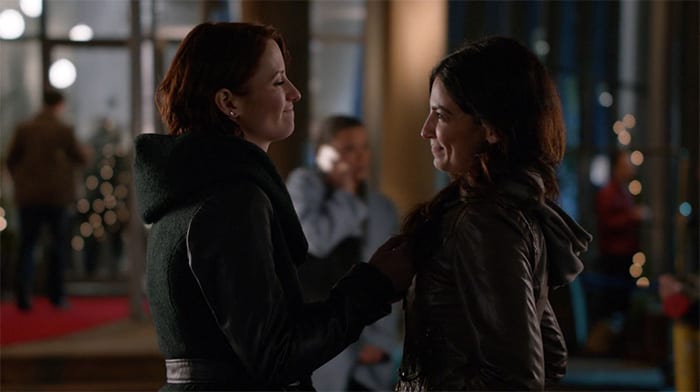
Alex wants to jeopardize her job to go after her dad? Maggie says “Ride or die” without a moment’s hesitation, or even a check in to see that Alex understands the consequences of her choices for both of them. Maggie instantly knows exactly what to say to comfort Alex about her dad. Juxtaposed with Kara needing to hand hold Mon-El through the basics of human contact and comfort, Sanvers clearly came off as the more intuitive, supportive, and healthy of the two.
Their biggest issues included Maggie not wanting to celebrate Valentine’s Day (because it reminds her of when she was forcibly outed in high school and her parents kicked her out afterward), Maggie being a serial cheater (and hiding that from Alex), and Alex sort of bottling up what was going on with her dad. Each and every time, their conflicts were resolved quickly and honestly.
The conflict over Valentine’s Day establishes that they’re both willing to listen to each other’s perspectives and compromise/make sacrifices in order to bring about something that honors each other and the relationship. Alex’s emotional turmoil about Jeremiah showed us that Maggie can cut through Alex bottling up her feelings—both figuratively and literally in that she drinks when she’s having a hard time (seriously, this is a problem for Alex and has been since S1). By the end of both of these episodes, their issues were resolved with good communication, constantly checking in, and a willingness to adapt to the other person’s needs.
As with Valentine’s Day, the run-in with Maggie’s ex brought up Maggie’s tendency to build walls around herself, especially when it comes to how her past wounds affect her present. However, when Alex finds out that Maggie cheated on her ex, she doesn’t react with fear or distrust, but with understanding.
Alex: This isn’t about the fact that you cheated, okay? We have all done dumb things. This is about the fact that you don’t trust me enough to tell me the truth.
Maggie: I wanted to.
Alex: Listen. I’ve thought a lot about this. You have a pattern of keeping things to yourself. You hid the truth about Emily, you made her seem like the bad guy. And then before that, you didn’t tell me what really happened when you came out to your parents, and how badly they reacted. You don’t like to talk about you.
Maggie: I know.
Alex: So, I think that when your parents didn’t accept you, you stopped trusting people that are closest to you, and I totally get that. But, Maggie, you don’t have to be guarded with me, okay? I’m not here to judge you for things that happened in the past, I’m here to help you heal. (2×17, “Distant Sun”)
Moving forward after this conversation, Maggie doesn’t appear to be guarded, just as Alex doesn’t hide things from Maggie after everything that went on with Jeremiah. They’ve both learned how not to stuff their feelings and be honest with each other. At least, that’s what S2 showed us.
As for the rest of the season, Alex’s kidnapping drove home to Maggie just how much she loves Alex and needs her in her life. After everyone almost dies in the finale, Alex proposes to Maggie, despite their being together for less than a year. Maggie’s response to this quick jump in their relationship status when her biggest fear going into the relationship was that Alex would overly-idealize her and rush into things? A happy smile.

And then…
We’re then jumped ahead six months in time for Season 3’s start, where we learn rather quickly that Maggie’s smile had indeed been a ‘yes’. The two of them are in a wedding-planning frenzy, in fact. Alex shows some signs of hesitance in the season opener—her focus is mostly on Kara’s grief and her own growing frustration at her sister’s closed off attitude. However we soon learn that she’s “down on this wedding” because her dad won’t be there to walk her down the aisle. She admits this to Maggie and then asks Space Dad (J’onn) fill in for Jeremiah in the “biggest, gayest wedding” National City has ever seen, solving that issue.
Maggie: Do you not wanna marry me?
Alex: Of course, I do. I…I wanna be your wife. I wanna have a dog. I wanna have the house. All of it. I just I just don’t want a big wedding. (3×01 “Girl of Steel”)
(Note the lack of children in this vision despite Alex “always knowing” she wanted kids. Maybe it was just a shorthand and kids are assumed, but a dog and house aren’t? Or maybe it was the writing staff twisting themselves into a windsor knot to avoid a mention of kids until the drama allowed it?)
Soon after, Alex has a [second] nice interaction with Sam’s daughter, Ruby. She makes a flip remark to Maggie about how that skill will be handy when they have kids, and Maggie tells her that she’s never seen herself as a mother. Alex says that’s fine.
“I guess we’ve never really talked about this.” —Alex (3×02 “Triggers”)
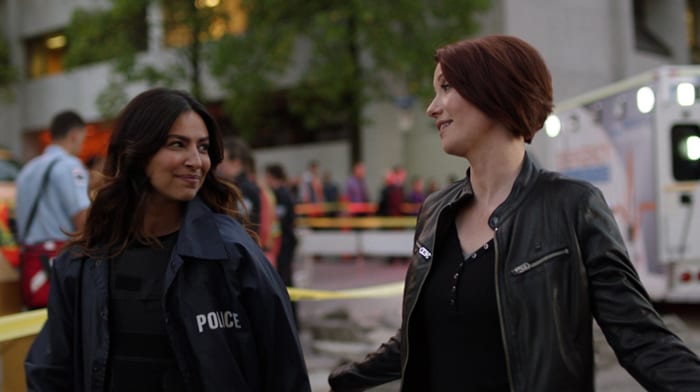
In the next episode, Alex and her mother learn from Maggie that her last interaction with her parents had been the time her father left her at her aunt’s house with a suitcase when she was 14 (right after she had been outed at school on Valentine’s Day), saying nothing besides, “You shamed me.” Alex encourages her to invite them to their wedding shower. Maggie does, and her father shows up. However, he can’t bring himself to stay and still clearly does not approve of her marrying a woman. The world is a mean and unfriendly place, and he feels he shouldn’t have to see his daughter hated. He points to the Speaker of the House’s racist politics as evidence.
“They’re building a wall to keep us out because in their minds, we are nothing but rapists and murderers. The only thing they hate more than a Mexicano is a homosexual. The world is not different, my dear.” —Oscar (3×03 “Far From The Tree”)
Later, Alex says that maybe the way things played out with her father might make Maggie feel differently about having kids of her own eventually; Maggie tells her that she just doesn’t see that happening. For a little bit, Alex seems to convince herself that just a relationship with Maggie will be “enough,” but when she sees Ruby in a recital, she runs out, telling Kara she really wants to have all the mom experiences, and that she knows there’s no working it out with Maggie.
“Maggie’s not gonna change her mind.” —Alex (3×04 “The Faithful”)
In 3×05, we pick up with an Alex who has finally voiced her feelings to Maggie, and the two of them are exhausted from the conversations that ensued over a period of “days” in between the episodes. They have sad “this is broken” sex, and Maggie asks Alex afterwards (in bed) if she really is going to give up on them because of some “notion” of becoming a mother. Alex tells her that it’s something she’s deeply felt her entire life, and has been the one constant when she’s thought about her future, even in the confusion of coming to understand her sexuality.
“It’s not some notion. Ever since I was little when I would see a mom and her kids this thing would happen to me. You know, it’s—It’s recognition that I was gonna be a mom, too.” —Alex (3×05 “Damage”)
The next morning they say goodbye to one another, and their wedding rings are left on the counter.
Fallacies
We have a lot to say about the choice to make the Sanvers break up about their different desires regarding children. It’s quite messy on both a Doylist and Watsonian level, and we’ll get to that, don’t worry. But first, we feel the need to point out several logical fallacies presented in the storytelling that are tied to our society’s conceptualization of femininity, womanhood, and motherhood.
These may not stand out to some viewers, and as always when we’re discussing the implications of stories from a reader response perspective, your personal mileage may vary. We’re not trying to say this is what the writers meant to imply, or even that they do or ought to bother everyone as much as they bother us. As a woman raised in a conservative religious environment, came out as queer later in life, and has been diagnosed as infertile, Gretchen especially has had to think about these issues more than most in a deeply personal, intimate way. She spends a lot of time teasing out the assumptions about womanhood and motherhood in media and that perspective influenced how she approached the Sanvers baby debate.
Alex’s sudden, consuming desire to have children stood out to both of us this season, as it was never a point of characterization for her before. We’ll dig into our confusion about that in a little bit, but it bears mentioning now that the way the show went about scripting this made a lot of inaccurate and potentially harmful correlations. Being nurturing does not always equal wanting one’s own children, nor does liking children or having positive interactions with them. All of these things may be true of a person, and they can still not want to have their own kids.
Nevertheless, Alex’s desire for children seemed to be built initially on these things. As viewers, we were meant to equate her being ‘good with kids’ with a desire to have her own. As if one ‘naturally’ leads to the other with no need for further explication.
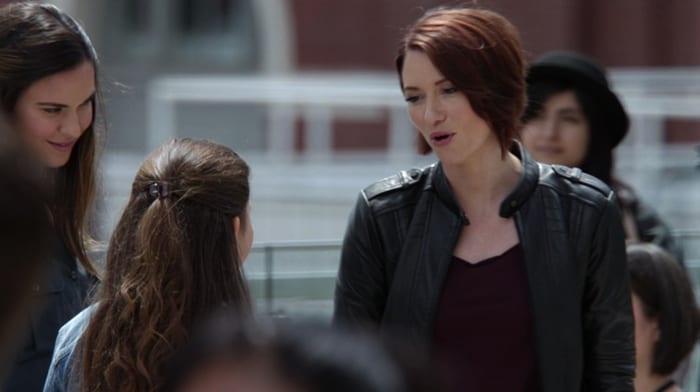
This isn’t inherently true, but it is frequently used as a basis for characters wanting children. Scratch that, we should say female characters, because rarely (if ever) is this used as shorthand for male characters having an overwhelming desire to be a father. No one assumes that just because Batman is good with kids that he must want his own (speaking of Batman: The Animated Series and not the Snyder films). Nor does anyone connect Superman’s positive, empathetic interactions with Billy Batson with a need for him to start a family right then and there or that his life would be incomplete without them now.
So what seems to underlie the need to connect positive interactions between female characters and children to a desire to be a mother? Maybe because she’s a woman and motherhood is an assumed desire for us in our culture?
Being a woman does not have to mean wanting children. We’ll say it again, a female character does not have to want children; not all women want kids and that’s okay. You can tell a story about women without including kids. Leaving out children does not somehow make a female character’s story less valid. It seems ridiculous to point this out in 2017. And yet, we had a story about two female characters in a relationship with each other—neither of whom had expressed any desire for children in almost an entire season of dating—and they broke up over kids.
Given all the logical shorthand necessary to make this happen, it’s difficult not to come away with the assumption that it’s only about kids because it’s about two women. And, you know, all women want babies, especially women who are nurturing, like children, and have good interactions with them. No woman who likes kids would ever not want her own!
This isn’t to say that there aren’t nurturing women who like children, have positive relationships with them, and want to have their own. Those women indeed exist. And, there are women for whom all of that is true, but they don’t want kids. What bothers us is the assumed correlation between these concepts in Alex’s arc. Look us in the face and tell us that this same story would have been written had it been two gay men. We thought not.
(Except on Crazy Ex Girlfriend, possibly. But that’s the exception to many rules.)
Really, all we’re saying is that there’s no reason this had to be the story. For us, the way that it was told relied on common assumptions and shorthands that are frustrating to see repeated seemingly without a thought as to their inclusion or implications.
Just Plain Weird
It also relied on some narrative choices and character actions that even after numerous viewings and conversations, we can’t make heads or tails of.
The first and most obvious being, of course, that Alex and Maggie did not once broach this topic in the six months they were engaged, or even the time they spent together before that. Sure, we can argue the time-jump was more for the benefit of Kara’s arc, so maybe it’s not going to land as smoothly for other characters, but this really pushes the envelope of any kind of believability. Especially given how we had seen them behave up until this point.
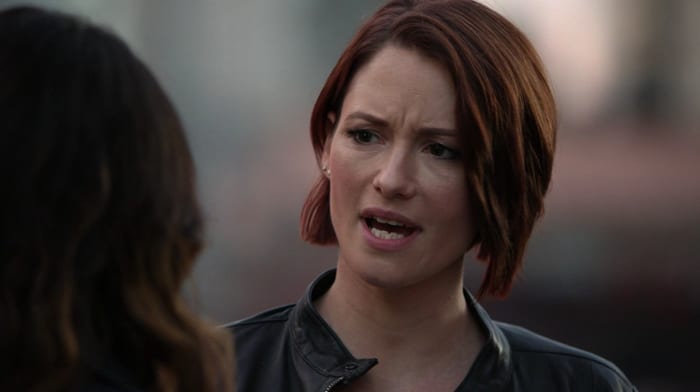
Hell, the one stereotype that was somehow overlooked in this scripting is also the one that in our opinion, tends to hold the most water: two women in a relationship are known for being rather over-communicative, and have a tendency toward over-analysis. Which yeah, was a stereotype we saw play out between them in Season 2. There’d be moments where their views weren’t aligned, they’d both talk about their feelings, often at length, and then they’d normally both make concessions to bring about a desirable outcome. Think their Valentine’s Day dispute. There was also an emphasis placed on letting their respective guards down, and how they were able to trust in each other.
Yet somehow, these same two people, who were now explicitly planning a lifetime together (the proposal rather suggests this), didn’t bother even talking about the long-term? Especially given that they’re both in high-risk jobs, so it’s not exactly like they’re on a standard domestic trajectory (hell, even getting a mortgage together would come with increased financial risk compared to any other couple). And especially, especially given that this is a relationship where they would be unable to have children without a whole lot of planning. Seriously, motherhood has been a constant in Alex’s life, but she never even wanted to talk about surrogacy vs. sperm donation vs. adoption once she started planning a lifetime together with another woman?
Actually, let’s stick on that high-risk-job aspect for a second longer, because if this has been the one crystal clear thing to Alex, wouldn’t she have had to think about how it might manifest when her life is literally on the line every day? Would she have opted out of the field for some time, and is that something she’s discussed with J’onn before? If she had assumed a stay-at-home or more available partner, becoming engaged to a homicide detective didn’t make the topic worth reassessing at all? In fact, how could she have been assuming they were on the same page when that page comes with about 85 different restrictions and caveats just by their inherent positions in life?
How did Alex see motherhood happening for herself, realistically? It’s not like a well-behaved preteen in need of only mild supervision from an adoptive parent is going to just fall into her lap, right?
Similarly, was Maggie just assuming they were on the same page for a “no kids” plan? Because even in a relationship with two women, having kids is still a bit of a default expectation in our society. And even if she maybe figured that both of their careers made this choice a bit unrealistic so it was at least a reasonable assumption, she never thought to ask this of Alex? The person she knows to be navigating a gay relationship for the first time, who might still have had some ingrained heteronormative assumptions that she’s sorting through? Especially when one of Maggie’s worries when entering into this relationship was explicitly that “firsts” rarely work out, in part because of these common pitfalls?
It’s to the point where we’re seriously wondering what Alex and Maggie could have possibly talked about for half a year. Somehow we doubt that there were so many appetizers to be ordered that they didn’t have time for one single conversation about the most obvious topic for any couple about to marry. It is utterly unrealistic that it did not come up between these two women.

On the topic of heteronormative assumptions, let’s take a look at the fact that Alex never, not once, thought to reassess her opinions about motherhood when she realized she was gay.
Now, this isn’t to say that queer women can’t automatically want kids or that straight women don’t question their desire for children when they reach adulthood. Rather, based on what we see with Alex specifically, she had lived much of her life within a very heteronormative framework. So much so that she assumed she might be asexual rather than queer when she realized she had no sexual desire for men. (Which is, we might add, a common experience for queer women in heteronormative cultures due to the fact that within these cultures, female sexuality is only ever framed in terms of their relationship to men, but we digress.)
What strikes us as odd is not that Alex landed on wanting children, but rather the explicit assertion that she never, not once, revisited this throughout the entirety of her coming out process. She spent her whole life within a heteronormative framework, and you’re telling us that when she realizes she no longer fits within it, she never once revisits her desire for children? An idea that up until the past year of her life had existed entirely within a framework of (presumably) marrying a man she would not have been sexually attracted to? This…
“No, it’s just something that I’ve always known. Even when everything else, whether it was boyfriend, girlfriend, whatever, when that was blurry the part of me being a mom, that’s always been crystal clear.” —Alex (3×05 “Damage”)
…just doesn’t make a whole lot of sense to us. Motherhood doesn’t exist as some kind of neutral, abstract concept in heteronormativity. As a newly out queer woman, she most definitely would have at least reassessed this no matter where she ended up landing. Marriage (to a man) and children are two halves of a whole in heteronormative society, so we find it unrealistic that Alex would reject one without at least considering if the other still made sense to her.
The way she talks about it though, it’s as if there was no second thought; she’s innately wired to be a mother, apparently. It rings exceedingly false to us, especially as two women who have both shifted our own perspectives on motherhood over the years.
And that isn’t even getting to how ‘compromise’ seemed to be framed as a battle to convince the other to give in and change their mind. Now, in the past, Maggie and Alex have compromised by listening to and adapting to the other person’s perspective (see: Valentine’s Day). That’s a kind of compromise, and one that doesn’t always work when two people have fundamental disagreements about how they perceive their future together, and we get that. That’s totally fair.
It is odd for Maggie and Alex’s relationship, though. The show had established that these women talk about everything together. But now, they dig in their heels and don’t talk to each other. Moreover, all of this occurs in the space of a few weeks (we learned Monday night that no more than a month has passed in S3 so far).
Now, we’re not saying that this hasn’t happened for people, one thing getting so big it breaks a relationship in a sudden, rushed manner. At the same time, they only tried to convince each other that their perception should be the defining one for their relationship. That was the only definition of ‘compromise’ we were given: convincing the other person that I’m right and they should do things my way. That’s…a kind of compromise, but absolutely not the only way.
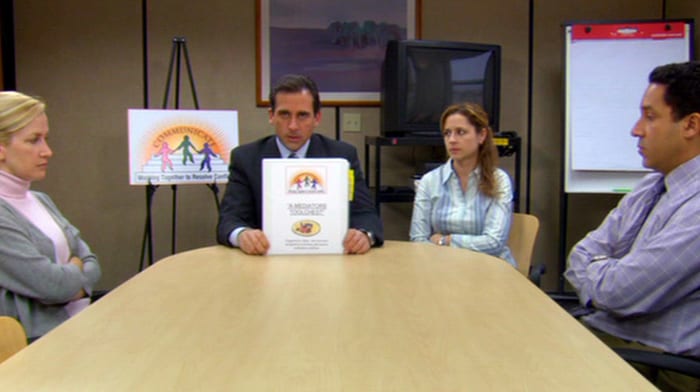
As someone for whom having children with a partner who did not particularly want them was a major issue, Gretchen found Sanvers’ stubbornness and the speed with which they let this break them up frustrating. This was a years long series of discussions with her partner. The way having children was discussed with Sanvers made it seem like this is an issue in which there is no possibility of compromise or things changing. As if the desire for or against having children is static, innate, and entirely individualistic. But it isn’t.
A partner who doesn’t feel a strong desire for children can be willing to entertain having them for someone they love. Someone who does want children can be willing to have a ‘wait and see’ attitude about them and not make up their mind right away. Two people can give dog ownership a shot as a first step, just to see how that might feel for both parties. Two people with differing desires for children can try, and find out they can’t have children (like Gretchen and her partner did). In her experience, it’s never a one and done issue. It’s a constant negotiation over months and years. Because life isn’t always what you expect, and things don’t always turn out the way you planned, so it’s best to hold things with an open hand.
Breaking up over an issue like this—one that isn’t toxic in any way as depicted and is something that could change for one or both of them—in so sudden a manner felt forced. And completely dismissive. Oh, they talked about it for “days”? Wow, what a strong bond they must have had.

Look, we know why it happened: the writers needed them to break up. What we dislike is that they chose to have Alex and Maggie not compromise on this issue in a manner that implied there is no other way to handle this specific discussion.
Which, again, we know there are real couples who would be equally unbendable on this topic. But this isn’t real life. As much as it can validate lived experience, this is a story, and it was written in a way that prioritizes a certain definition of “compromise” (i.e., intellectually convincing someone to do things your way) and a certain method of communication (i.e., assert yourself and dig in your heels, but if the other person doesn’t cave, that’s it, it’s over) to the exclusion of all else. And in a contrived way that contradicted previous characterizations.
Given how much they were willing to work through in S2, it comes across like they can’t handle disagreement at all. It’s their first true difference of opinion that they can’t settle with talking, and they break up over it after maybe a week of trying to work it out. That’s…not healthy. But it not being healthy isn’t framed as the takeaway. We’re meant to believe that this is truly just That Big of A Deal™. And yet, their process working through this is poorly represented on screen. That is to say: it wasn’t represented at all.
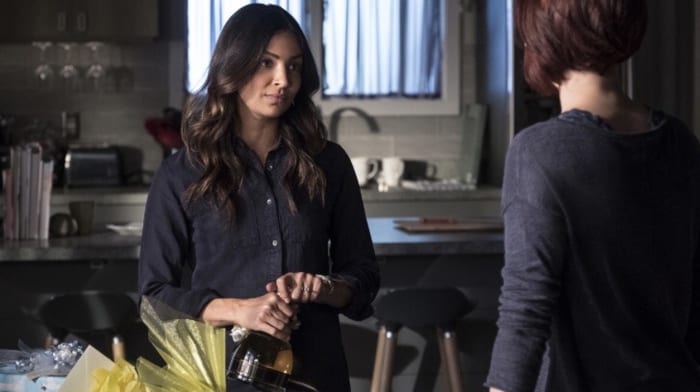
Now, we could give Supergirl the benefit of the doubt and say that Alex and Maggie tried other conversational options, but the reality is, we have no way of knowing since we weren’t shown them. In fact, we were barely shown this conflict at all, and it was enough for them to end the engagement in less time than it takes someone to get over a common cold. They had a couple of on-screen disagreements, plus a few moments where Alex said something was fine with her when it wasn’t. But the bulk of their difficult and apparently hurtful conversations simply didn’t exist anywhere but in our imaginations.
We’re just supposed to trust that they exhausted all options for this…but why? If these discussions are so important to their relationship that they’re going to break up their wedding over it, why don’t we get them? Are the writers simply that lazy? It’s almost insulting to the viewer.
Then, while we’re on the topic of what they chose to show (or not), the thing that takes the cake for truly confounding us is the storyline with Maggie’s dad. We’re frankly unable to see the point of this at all. We think the idea was that Maggie got closure, and it was thanks to Alex’s encouragement. Maggie says as much during their breakup.
“You made me deal with my own stuff. Confronted my past. Stopped covering up the things I didn’t wanna look at.” —Maggie (3×05 “Damage”)
We sort of feel like this sentiment already applied last year, like when we learned about Maggie’s cheating, but yeah, it’s definitely important for partners to push one another. However, given that Maggie was thrown out of her house with nothing more than, “You’ve shamed me,” we think this is actually a case where a partner would be incredibly unlikely to suggest reaching out, let alone inviting these parents to their wedding. It feels unproductive, and a bit along the lines of how this show has handled weightier topics before, like the Daxamite slavers, for instance.
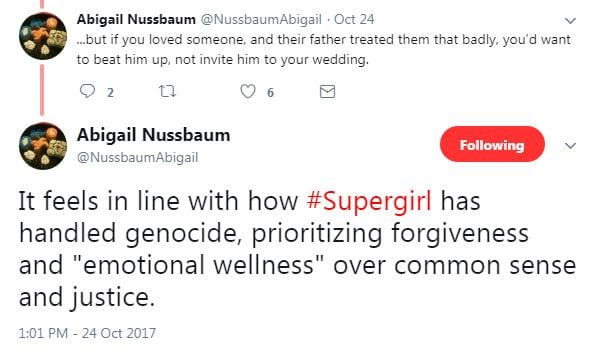
And Alex of all people wouldn’t have wanted to kick the guy’s ass?
Still, we applaud the show for not taking the easy out where everything is magically fine between Maggie and her dad. We liked that he still had issues with her sexuality, and she had a moment to tell him to shove it, more or less. But the rationale they gave him—that he’s experienced a fair share of racism and understands that the world is really bad, so Maggie will never be accepted—makes next to no sense.
It’s one thing to want to try and protect your child against prejudice and feel a sense of disappointment if it turns out they’re going to walk a harder road. Yet cutting them out and saying they “shamed” you? How does that fit in at all? It wasn’t even framed as, “I’m worried you’ve destroyed the comfortable life I’ve fought for.” It was literally, “I wanted you to belong, and you won’t, so I can’t witness this.”
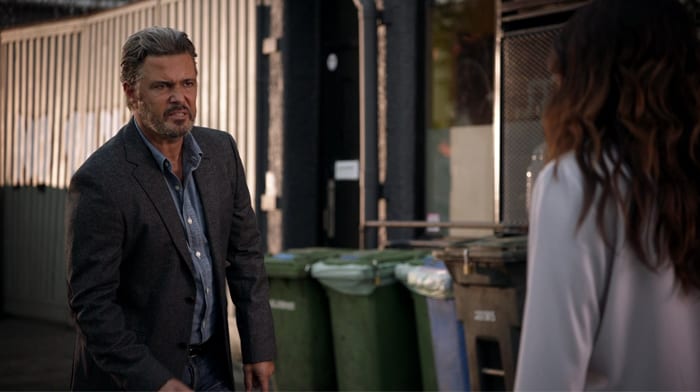
It’s really the word “shame” that sticks in our craw too, because that is so obviously a morally charged statement. We’re sorry, but there’s the implicit connection to religious conviction with that. That’s not shocking at all given Maggie’s backstory is pulled so heavily from Renee Montoya, but to just throw that matzo ball out there and not follow up on the implications? It’s irresponsible to leave it at that and then pivot to a message of, “his bigotry is understandable because he’s experienced prejudice too.”
It’s clear that the writers simply wanted to give Maggie a moment of saying that he doesn’t matter, since Alex is her true family now. But our question is…why? Why show this over something that actually develops Maggie and Alex’s relationship together, especially since their time to hash out this issue was so limited? And why drive this message home, only to script Maggie as completely unbendable and unable to compromise on children? If Alex is her family and all she needs in life, wouldn’t that make room for some negotiation?
It’s especially egregious since Maggie’s viewpoint about not wanting kids was barely explained past, “I don’t see it happening.” She explicitly says it isn’t about her family, which might have made sense given how messed up her relationship to her parents is. But we’re denied even that bit of consistent characterization.
“Sweetie, my not wanting kids has nothing to do with my parents or my childhood.” —Maggie (3×03 “Far From the Tree”)
Yeah, we know a few therapists who might disagree with that.
Again, we’re not at all against bringing Maggie’s parents into the mix and having things remain broken. That’s life sometimes, and it’s unfair and horrible, and seeing a character dealing with ostracization from her parents is probably something a lot of viewers could relate to and find validating. It’s just that this method of doing so is illogical at best, and it came at the cost developing Alex and Maggie’s story more. Given how rushed and random this breakup felt, that’s important to consider.
Not to mention, doesn’t this just serve to turn the screws more? Oh good, Alex and Maggie can’t work it out and Maggie’s lost her only sense of family. Glad we needed that reiterated.

A Note on The Straight Gaze of the Plotline
Given the number of contrivances, assumptions, and downright alien behavior that was required to have this breakup occur in this manner (and on this timeline), it’s clear that this was the story told because it’s what the writers wanted to tell. And…yes. There’s many interviews to this point, like Robert Rovner’s comments:
“We love this relationship we’ve created and, with that, we’re going to be telling a modern-day love story that really honors their relationship. [It] hopefully will resonate and, I think, will be very satisfying.”
Andrew Kreisberg provided even more context:
“We borrowed from a page of our own lives. I and one of the other writers both left long-term relationships because the person we were with didn’t want to have children. They were very difficult breakups.”
So, this was a story that meant a lot to the writers, and clearly something that’s true to life for their experiences. It’s also something that’s probably happened with plenty of lesbian couples. However, as a narrative, we find it uninspired and a poor fit for these specific characters. And we can’t help but feel as though it’s also a bit more suited to a straight couple regarding the specific way this unfolded.
Perhaps part of that is because of what we’ve already mentioned; with two women, children has to be a deliberate decision, and therefore almost always at least comes up in conversation. “Huh, we’ve never talked about this” six months into an engagement (nine months total? Twelve?) pushes the envelope, to say the least. Particularly with Maggie and Alex’s established dynamic, not to belabor the point.
We’re also scratching our heads at what is particularly “modern-day” about this. Kreisberg said in his same interview that it would feel too “70s” for Maggie to have gotten a job offer in another city, but…disagreeing about babies is somehow contemporary?
Straight couples have been breaking up in media over ‘the baby question’ for at least as long as jobs have been a point of contention. It revolving around queer women doesn’t somehow make breaking up over babies ‘modern’. Especially when babies are already central to female storylines in media (both straight and queer); to us, regardless of how true to life the experience is, calling it more ‘modern’ than breaking up over a job seems disingenuous.

And, as we mentioned above, wlw couples tend to over-communicate. Yes, that’s a stereotype, but it’s also one that’s fairly accurate to a lot of wlw experience, including Kylie’s own. It makes zero sense to us that two women would not have brought this up in a six-month engagement, even if Alex was focused on Kara for much of that time. Further, this idea that Maggie and Alex don’t know each other well or don’t air issues sits in contention with last season’s scripting. If their relationship changed that much since getting engaged, we’d like to have some context as to why and how rather than a time gap + new characterization with no explanation whatsoever.
Even apart from that, it’s countered by the wedding shower trivia game that Maggie aces this season. So, Maggie knows Alex well enough to get all that right—and being a mother was so important to Alex that she never even questioned it would be a part of their lives—yet they never talked about having children together. Sure, Jan.
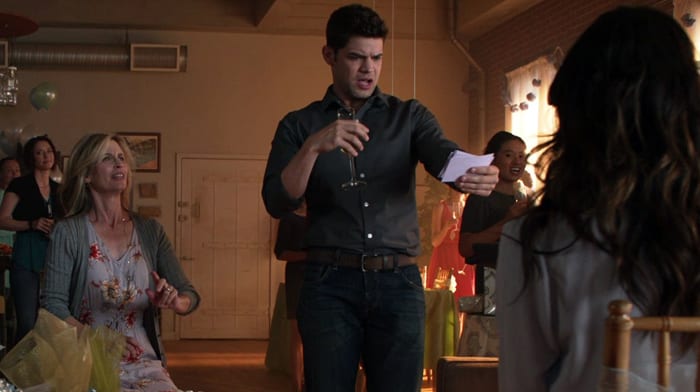
We also have no idea what to do with the “biggest, gayest wedding” that National City’s ever seen. Again, this rings rather false to us, particularly for these two women. Maggie is the person who didn’t even want to celebrate Valentine’s Day. Alex has never exactly felt like someone champing at the bit to dance on Pride floats. Especially knowing that this wedding was never going to take place, it just feels like cheap representation “points” at best. At worst, it’s to make the breakup ~even more painful~ to the viewer, which is an emotional manipulation tactic we thought writers knew to avoid at this point, given the backlash from the Spring Slaughter.
Overall, this struck us as written in a very heteronormative way. Of course two women would disagree about babies. Of course they wouldn’t have talked about it during a six-month engagement. Of course they would dig their heels in and not budge. Not because it’s true to these characters, but because that’s what would happen in a straight romance. This wouldn’t look any different if it were about a straight couple, and in fact, the characterization makes a hell of a lot more sense for a straight couple for whom having babies doesn’t have to be an intentional choice from the beginning.
Looking back on it, it’s very much as if someone took an experience from a straight relationship and applied it to queer women. This isn’t inherently a bad thing, because “special treatment” can so easily feel disingenuous and pandering. But when told in this way, it rather erases what is unique about queer relationships between women. It certainly erases what was unique to Sanvers.

To us, it’s as though little to no thought (or research) was given as to how this particular discussion might look with two queer women involved. There are ways this could have rung truer to wlw experience, but that perspective was not incorporated in any meaningful way.
If it Had to Be Babies
But, okay…okay. What’s pandering or falls flat to us may be very validating and compelling for others. Obviously, the choice to have children is something that’s relevant for many, and it’s not the worst way to script a breakup where you don’t want either party to seem like the bad guy. We do see that. However, if the breakup did have to be about this issue, we can’t stop thinking that this was maybe one of the most forced ways to write it.
For one, the roles strike us as reversed. We’re not trying to say Alex eventually wanting kids is “out of character” or impossible for her, but we do think it makes more sense with what’s been established already if Maggie had been the one attached to the idea of having kids, while Alex doesn’t want any.
In Maggie’s case, she wants to feel like she has family outside of her parents, as she outright said this season. So, creating her own family would be the best way towards that acceptance. Plus, there’s that kind of subconscious ‘fixing what’s broken’ element, which is pretty common for people in her position. There’s also a strong emphasis placed on having children in Mexican culture (or generally any culture with a strong Catholic underpinning). That doesn’t have to define her by any means, and would be something that we could even see Maggie want to push against, but it is there. At the least, we can’t imagine a conversation about having children eluding her.
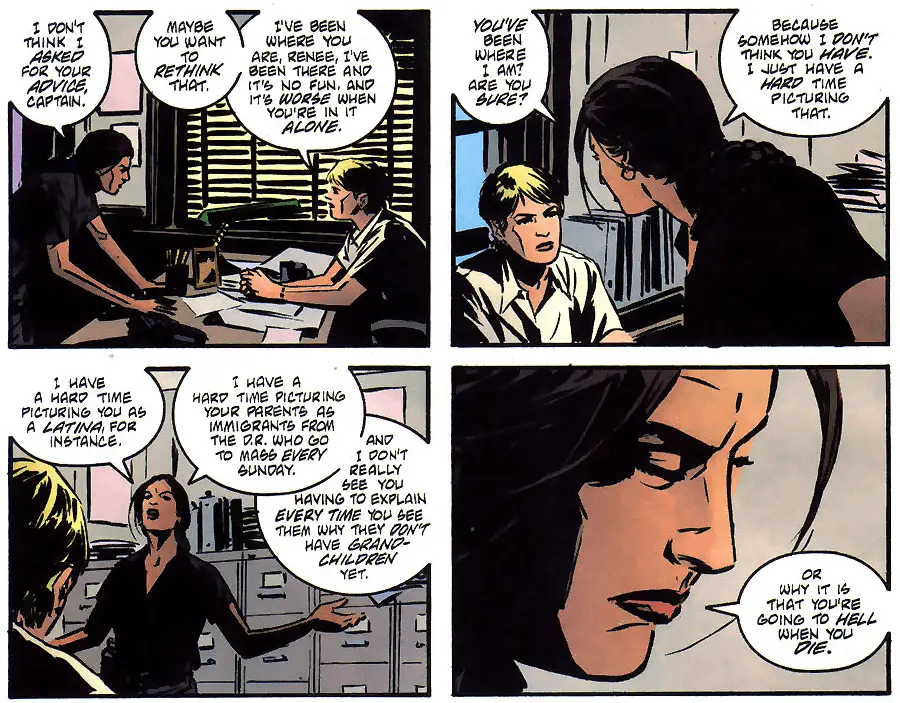
With Alex, the case for reversing this dynamic is even stronger. Last year, we had a front-row seat to her coming out arc. It was “later in life” (kind of), because she hadn’t given herself the space to explore these feelings in high school, even though she had been having them. We were told that a large part of that was a direct result of her caretaking for Kara.
Being in that role more or less hampered Alex’s emotional development, and it was an important step towards living honestly and happily that she prioritized herself and dug into how she was feeling. It’s not that being in a caretaking role again would necessarily undo all of this, but this is more than enough to give her the space to say, “here’s why having children doesn’t make sense for me right now.”
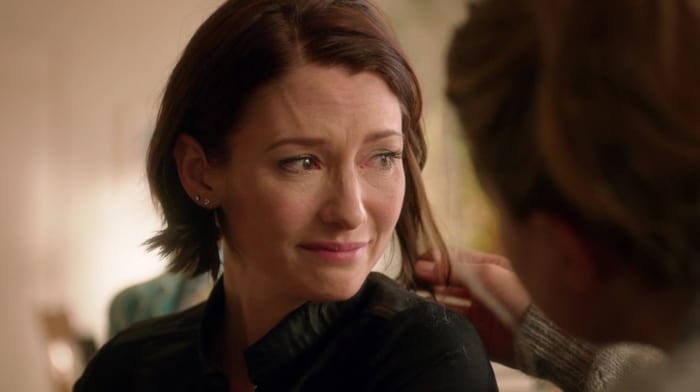
There’s also the fact that coming out inherently throws a whole lot of previously-held assumptions into question. Particularly ones as a result of living in a patriarchal society where “mother” is the assumed role for women. Alex said it was something she always knew she’d be, and yeah, that’s probably something plenty of gay women also feel. But what we’re saying is that the writers were handed the perfect springboard into scripting this for both characters, and a springboard into really digging into the topic of motherhood and assumed roles.
Instead, they went with the most formulaic, paper-thin option. Alex always felt this way and just never mentioned it until Ruby stirred these feelings for her. Maggie didn’t see it happening. For reasons.
Not that people aren’t allowed to not want children for any other reason than they don’t want them. That’s completely valid. At the same time, if the writers’ intent was to make a point about how ‘not everyone needs a reason to not have kids’ that intent was utterly lost in the way the conversations were scripted. As our protagonist, Alex is given more space to explicate her feelings. It makes sense, but it also contributes to the sense that Maggie’s choices and desires were being written not with a view to how they contribute to and inform her character, but how they conflict with Alex’s. It doesn’t ultimately matter why she doesn’t want children, only that she doesn’t because this conflicts with Alex’s desire to have them.
We’re trying to ignore the implications of this too. That because Alex is our protagonist, she had to be the one with the more ‘sympathetic’ viewpoint, which is absolute nonsense, since there’s nothing wrong with not wanting kids. There’s also the whole “Alex is coded a bit more as the ‘femme’ partner,” which mercifully isn’t that strong here other than apparel choices on Valentine’s Day. But it’s also not exactly shocking that the one in the dress was the one who we were told wanted to have kids, logic, experience, and messaging be damned.
We would have found it far more compelling to write this as being ‘about babies’ but not really about babies, if you know what we mean. That on the surface, the choice to have children would have acted as the triggering issue, but underneath it was something else. What ‘something else’ could it have been about? Well, we have Maggie’s stated fear of Alex’s over-idealization and romanticization of their relationship, which was the reason Maggie didn’t want to date Alex in the first place.
“Everything is going to feel really heightened and shiny…And I shouldn’t get involved with someone who’s just fresh off the boat. Those relationships never really work out.” —Maggie (2×06 “Changing”)
In fact, babies or no, this really should have been about Alex’s idealization no matter what. The proposal was super rushed. They’d been dating for at most 6 months before Alex proposes, and that’s being generous. She also does so after a really heightened and dangerous situation where there are a lot of emotions in the air and everyone was afraid they were going to die and/or become slaves to an imperialist, colonizing alien force.
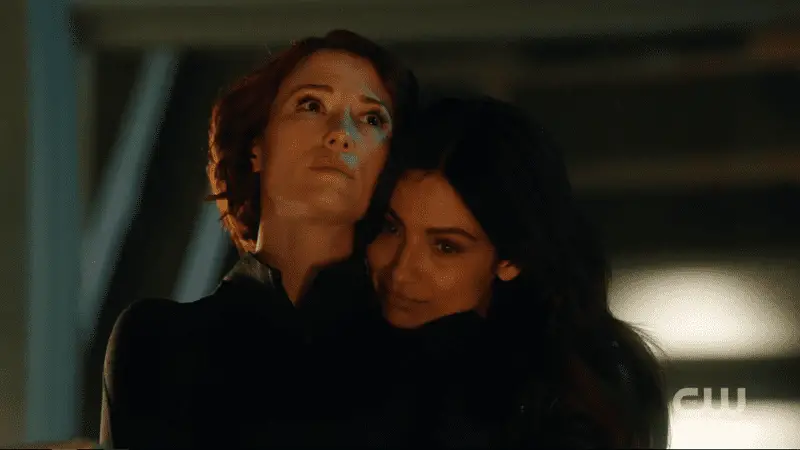
Yes, they’re older women and they’d been through a lot in the months they were dating, but still. Alex’s immediate impulse to propose in that situation should have put Maggie on her guard given her previous concerns about Alex idealizing her. (And Alex does idealize her. She tells Maggie she thought she was perfect before finding out about the cheating and follows this comment up with “It’s really nice to see you have problems, too.” That’s not a normal reaction to finding out your girlfriend is a cheater.)
Maggie didn’t have to say yes. They ended S2 somewhat ambiguously. They could have started S3 with Maggie saying “no” or even “I’m so flattered, hence my giant smile, but let’s wait on this for now.” The writing team knew Floriana Lima wouldn’t be coming back at least by the time they started writing S3, so why even bait a wedding with an engagement? Maggie recommending that they wait a while before getting engaged would have made perfect sense based on her previous concerns.
Within that framework, a discussion of having children could even have been the straw that broke the camel’s back. Maggie had already expressed concern over Alex’s idealization, so she puts a hold on getting married while they get to know each other better. When the discussion of children inevitably comes up, they realize they didn’t know each other as well as they thought and decide it won’t work out after all.
Instead, it feels like the writers wanted to eat their cake and have it to.
We don’t think they intentionally set out to hurt people or bait them. We think the scripting of Sanvers in S2 was likely an attempt to offer wlw viewers something wholesome, healthy, and supportive in the wlw ship department (something that had been lacking). The fact that they let their audience know over the hiatus that Lima wasn’t staying and would only be in a handful of episodes speaks to a level of good intent. The same goes for letting people know they weren’t going to kill off Maggie.
Yet even if we give them the benefit of the doubt and say they really wanted to give fans something happy (engagement + the idea of a big gay Sanvers wedding), knowing that they would have to end the ship, it still looks bad because of how paper thin the conflict was and how inconsistent the characterization needed to be. They threw out all the relationship stability of Sanvers in S2 to make the S3 break-up work. Good intentions may have driven every choice they made, but that doesn’t mean the results are well done, consistent, or particularly worthy of praise. They may not have intended a bait and switch, but we sympathize with the fans who had this reaction.
“If not Babies, What Else?”
So yes, the most compelling breakup option to us is that Maggie’s concerns over Alex’s idealization of their relationship play out in some way. The choice to have children isn’t a necessary part of that tension, though it’s not exactly hard to incorporate. Our reviewer Elizabeth posed the question, “if not over children, how would you have written this arc to satisfy the audience but also fit within the restrictions of Lima’s remaining time on the show?” That would be our first answer.
However, it’s far from the only one. We also humbly submit the following:
1. Something work-related. Yes, Kreisberg said it “felt 70s.” We haven’t the slightest idea what this means (nor do we feel that his opinion should be held up as the pinnacle of contemporary thought). Work pressures, someone taking work home, job offers, career changes, work-life balances, money issues, competing visions about long-term careers/difficulties finding a path that makes mutual sense…this is probably the number one reason couples break up, next to poor communication. And yes, shockingly we mean now, not just forty years ago.
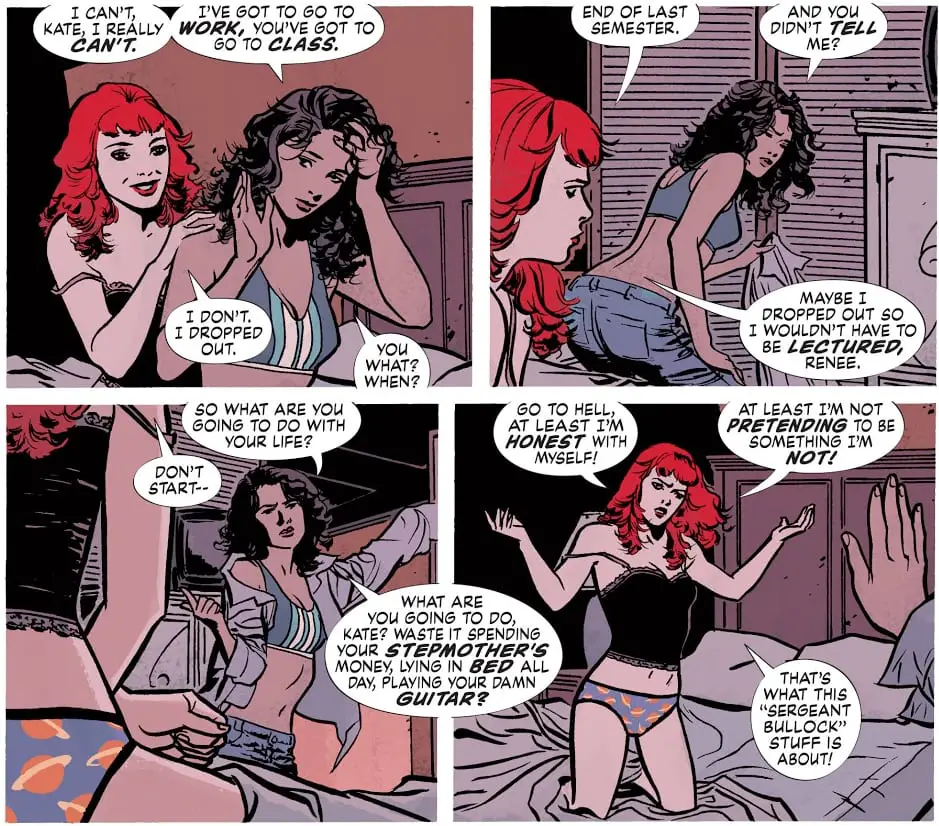
Also, this is the kind of platform where it could be “about work,” but not really about work, instead uncovering some underlying issues or anxieties they have. We personally find it preferable because it also doesn’t come with the moral weight that an argument over children includes.
2. Maggie and her dad reunite and it goes poorly, causing her to freak out about the idea of entering into anything domestic. Maybe this isn’t the most uplifting message, but we can definitely empathize with someone feeling like they come with too much baggage or still have too many unresolved issues, so they’re a bit more than hesitant to enter into such a permanent commitment.
There’s also the fact that these kinds of high emotions are a natural test for couples. Perhaps Alex misunderstands where Maggie’s coming from and has more of an attitude of, “you’re better off without him.” Or she pushes for a reconciliation in a way Maggie’s not ready for. Little things like that can cause horrible tension, especially when coupled with the incredibly rushed timeline of their proposal in the first place.

For some reason Kylie is reminded of a Less Than Jake song lyric, of all things:
“Did we take the time to really discover how little we know about each other?”
If the Supergirl writers were so hell-bent on bringing Maggie’s past back into this, why not tie that into potential points of weakness in their relationship, instead of using it to prove how they’re so gosh-darn perfect for each other, isn’t it a shame they both just won’t budge on this one thing?
3. Maggie and her dad reunite and it goes well, so she decides to go back home and try to make things right before continuing in a relationship.
Again, we did think it was interesting and valuable that the show allowed this familial dynamic to remain fractured, because not all parents come around. Further, it’s pretty clear that Maggie hasn’t had the healthiest dating pattern. She was a serial cheater who ended up preferring to date aliens because it was hard for her to relate to humans. Sure, she cited being a lesbian who had received negative social feedback as that reason, but…other queer [human] women wouldn’t have been ostracized too (or at least able to understand her perspective)?
Really, she was guarded before dating Alex, and even guarded into her relationship with Alex. She wasn’t open to a commitment, almost assuredly because of her experience with her family. It wouldn’t have been hard or a stretch to have her to come to the realization that maybe she was trying to fill a familial void with this string of (unsuccessful) relationships, or that she doesn’t feel like she could be the best partner to Alex—and certainly not the best mother—until she figures things out with her family.
This would leave plenty of space for Floriana Lima to return. She and Alex wouldn’t have even had to break up! Just a long-distance arrangement. If it became obvious that Lima was never coming back, then it wouldn’t exactly be hard to demonstrate how they’re growing apart, or were just growing frustrated with the situation.
4. Maggie cheats. We see this working best with the ‘Maggie is worried about Alex’s idealization of the relationship’ idea, as sort of the way she goes about imploding things. It’d be self-destructive behavior, and behavior that’s already established for this character. Maybe it’s even with the ex that Alex invited to dinner!
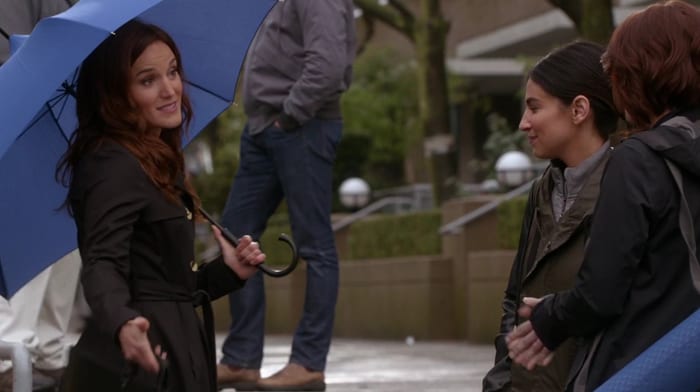
Yes, we’re saying this a bit tongue-in-cheek, and it’s not like we’d find this particularly refreshing. It has its own problematic tropes (then again, they didn’t have to have Maggie cheat on Emily in the first place), and it certainly wouldn’t be our first choice. Still, would we take this over off-screen, uncharacteristic refusals to compromise? Absolutely. But only because it actually makes sense with Maggie’s character.
5. They fall out of love.
Hey, guess what happens when you’re in a relationship for a while? The early ~magic~ wears off, and the rose-colored glasses through which you were viewing your new partner fall away. You see the idiosyncrasies, you see points of disagreement and incompatibility in habits, or philosophy, or outlook. Which can sometimes be endearing and comforting, and sometimes can be…something else.
Alex and Maggie seemed pretty compatible last year, but they were also in the infant stages of their relationship, really. We don’t think everyone is doomed to fall out of love eventually by any stretch of the imagination, but it’s not unthinkable here. This ties back into the question of “how well do they even know each other?” and what we consider to be a rushed proposal. Hell, it even ties back into Maggie’s canonical concerns over getting involved with someone’s “first.”
“Well, we’re at really different places.” (2×05 “Changing”)
Because…yeah, things are heightened and shiny. That intensity can allow a relationship to last awhile, too. But Maggie is also dead-on about those relationships rarely working out. That actually does scream “modern-day” to us.
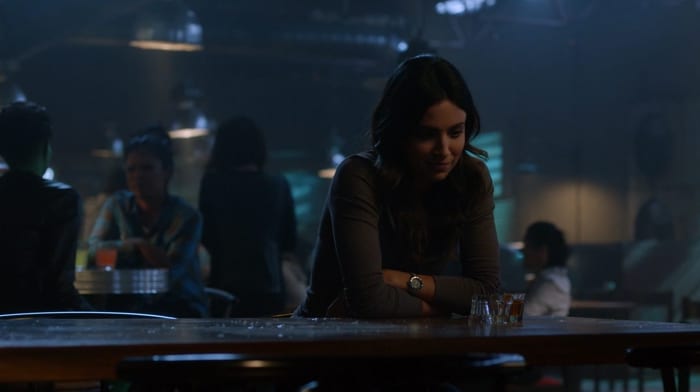
6. Something farcical.
We know this probably won’t be a popular option, but hear us out. Supergirl is a campy show to begin with. We appreciated the gravity with which Alex’s coming out story was treated, and we do think the show’s delivered quite a few heavy-hitting emotional moments (this season included the exploration of Kara’s PTSD, for instance). At the same time, we’ve been through the Spring Slaughter, and there’s a general lacking in happy endings for wlw relationships even still.
Lima had to leave the show, and we don’t fault her for that one bit. We do fault the writers for including a proposal at all at the end of last year knowing she likely wasn’t returning. But what’s done is done, and these were the cards they had.
So really…why couldn’t we have been spared the overwrought and rushed conflict that only delivers the message, “even the most in-love and perfectly compatible lesbian couples are doomed!”? Why couldn’t they have done this in a light-hearted manner? It’d at least be inventive, and not as viscerally unpleasant or frustrating to sit through.
What are some options there? Well…
- Maggie gets discovered as an actor and cast as a regular on a show and must leave National City for Hollywood because of an ironclad acting contract. Everyone likes a good lampshade, right?
- Kara says she’s going to leave Earth to get back together with Mon-El, and the only way Alex can convince her to stay is if she’s single too. We suspect many viewers would completely understand this choice.
- Maggie travels the world to search for her missing homicide partner, because what detective seriously doesn’t have a partner?
- Alex discovers that Maggie has secretly been running a successful Youtube ASMR channel. When she finally watches her make one (50 minutes of Maggie crinkling paper while whispering about her favorite soft pretzel toppings), she loses all respect for her.
- One of Maggie’s alien lovers returns to inform her that she’s pregnant. Maggie must go to the far-away planet of Drib-Toragu to raise the kid. It’s a lava planet.
- Ridiculous living-together annoyances: Maggie smacks her lips when she drinks coffee, never puts the cap on the toothpaste, buys the WRONG PEANUT BUTTER after Alex told her to never get one with soybean oil, always leaves a stack of dishes, or eats her peas one at a time.
- Alex starts saying “bingo bongo!” as her new catch-phrase, and Maggie can’t take it anymore.
- Alex and Maggie can’t decide who walks down the aisle to “Here Comes the Bride”.
- The end of romance! Alex is pooping before work and Maggie walks in on her to give her a goodbye kiss. (This actually happened to someone Kylie knows in real life, so it’s gotta be worth telling.)
- Alex keeps up with the Kardashians. When she won’t admit it to Maggie, Maggie gives her a lie-detector test, which Alex promptly fails, breaking up with her in the process over her embarrassment.
- For something thoroughly modern: during the six month gap, Alex and Maggie binged a show and joined its fandom. Maggie consistently gets more notes than Alex, and the competition between their blogs becomes too much to handle. This would include lots of meta-jokes about Supergirl discourse.
Is it weird that we’re genuinely compelled by a pregnant alien lover?
In Summation of Sanvers
We’re not saying the Sanvers breakup over wanting to have children was unworkable as a concept. While we do think there are more compelling stories, our biggest struggles were how little respect there was for previous characterizations and how little recognition there was of how queer relationships between women differ from cis, straight relationships. It was rushed, sloppy, and paper-thin in execution, relying on emotional off-screen conversations we’re not privy to and a time-gap that messes with their established relationship dynamic. It’s basically the most generic thing you can do without killing off a lesbian. In the myriad of other options, why they went with this is beyond us, especially when they didn’t need the engagement to happen at all.
Even if they meant well, it reads as bait-y. “Big Gay Wedding™! Oh wait, nevermind.” Like, we get that it may be entirely unintentional, but we’re flummoxed as to why no one in the writers’ room thought to point out that this might not play well with fans who have suffered as much as wlw have over the past few years. They may have been really trying to do something nice for us queer lady fans, but with how sidelined Sanvers has been from the main narrative since 2B and how poorly executed this was, we’re not all that moved by it.
Perhaps part of the reason for our own tepid response is because even last year, we felt like the scripting of Maggie was completely flat. Anything established about her in 2A seemed to go out the window in 2B, instead with her being scripted to fit the needs plot. We know others feel differently, including our fellow writers. However, we do think this trend continued in S3.
Maggie needed to be super into a huge wedding. She needed to unflinchingly not want babies, for reasons that were quite literally never articulated beyond the vague idea of her not seeing it. She needed to feel that Alex was family to her for reasons we can’t quite parse. And she needed to feel like reaching out to her father was a good and necessary step, to demonstrate how *much* there was to this relationship.
At the end of the day, Maggie’s character was originally meant to be in one season, seemingly as a kind of gay Mary Poppins who would float in, serve as the trigger to Alex’s coming-out story, and then fly away. That’s basically still what happened, and we have no answers why a proposal or engagement tease was part of that.
What frustrates us, however, is really the missed opportunity. Alex’s coming out story felt so true-to-life, especially for someone in their late 20s. Even knowing this relationship was ending, there was one hell of an authentic story to tell in there—the story Maggie full on mentioned when the idea of them dating first came up.
Instead, we got a bunch of tired tropes and hand-waves, with writing that was so thin that we weren’t even shown the conflict. Sure, we could fill in these blanks because of the common cultural assumptions that fed into this, but that doesn’t make it ‘good’ writing, nor does it make us want to give the Supergirl team props. They tried, yes, and it’s better than Maggie being found dead.
But it could have been so much more. Missed opportunities like these are why we need diverse writers rooms and wlw having a definitive say in telling their own stories. Because the biggest shame of it all is that it probably would have been that much more authentic, had the writers merely been willing to ask.





